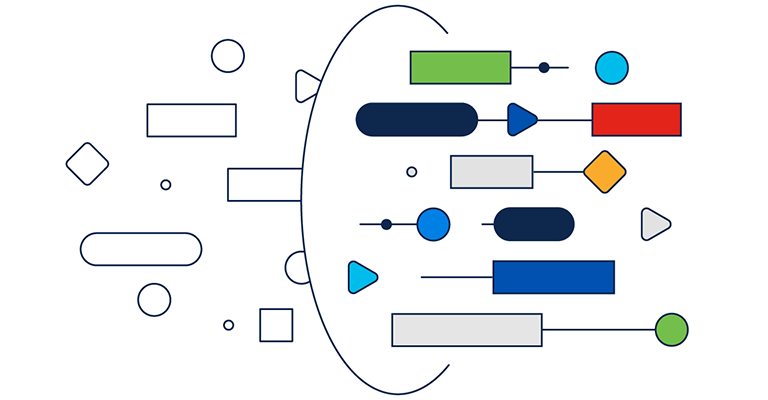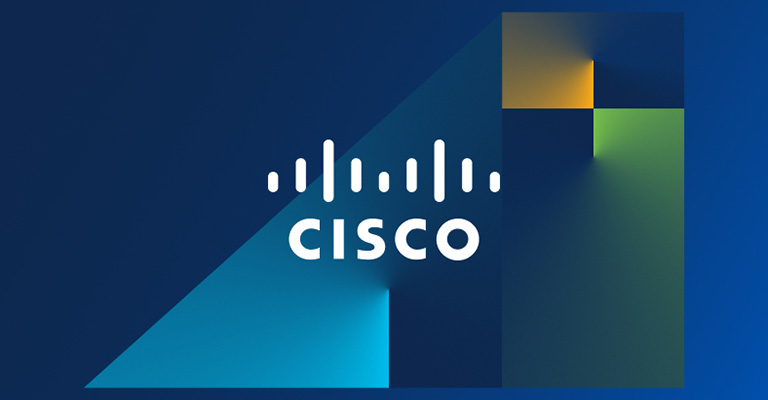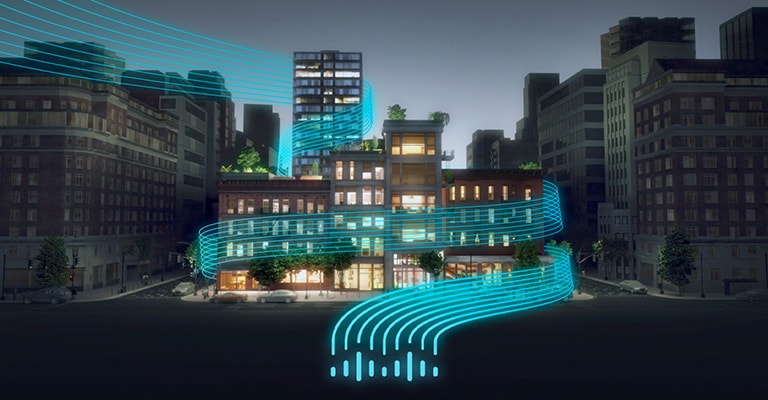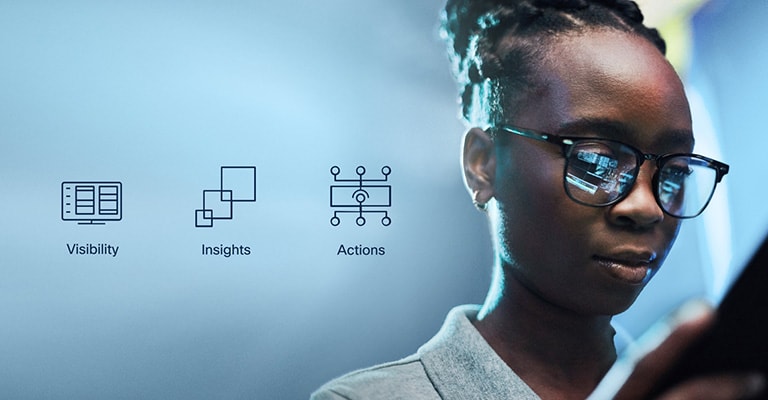Introduction
Given the hype — and fears — around artificial intelligence (AI), it’s easy to forget its true promise: to make our lives simpler, seamless, and more productive.
Cisco innovations are doing just that. The result of a billion-dollar investment in AI, it’s now embedded across Cisco’s entire portfolio — enabling customer experiences that were unimaginable just a few years ago. And doing it with the highest standards for the ethical, responsible use of this powerful technology.

EVP, Chief Customer Experience Officer

From a customer experience perspective, that means Cisco products are becoming ever more powerful, predictive, secure, and — thanks to natural language models and ChatGPT-like interfaces — intuitive.
Jeetu Patel, Cisco’s executive vice president and general manager of security and collaboration, calls Cisco products like Cisco Networking Cloud, Security Cloud, Webex, and their related AI Assistants “magical.” But all are rooted in the real-world goal of solving critical customer challenges.
“It’s not just research and development for science projects,” said Vijoy Pandey, senior vice president at Outshift by Cisco, the company’s innovation and incubation engine, “but to solve tough customer business problems with new and innovative uses of technology.”
Such progress will only accelerate with Cisco’s recently completed Splunk acquisition and full partnership with NVIDIA, whose chips are already supporting Cisco’s AI technologies.
That’s welcome news for organizations struggling with this massive transformation.
As Cisco’s AI Readiness Index found, only 14 percent worldwide are ready to integrate AI into their businesses. Cisco makes it easier, as Zeus Kerravala, principal analyst at ZK Research, observed.
“Cisco simplifies AI and security, two of the biggest pain points for information technology organizations,” he wrote in SiliconAngle. “For a company the size of Cisco, it has shown a high level of nimbleness in transitioning their strategy.”
Here are just a few ways in which AI is transforming Cisco’s customer experience, in three critical areas: networking, security, and collaboration.
Managing network complexity just got simpler.
With unique networking and compute solutions – including the Silicon One chip and Routed Optical Networking, Cisco helps organizations meet the explosive demands of AI usage at scale, while dramatically lowering the energy demands of data centers.
Cisco also leverages an all but unmatched breadth of data across multiple domains and at massive scale. This is essential for driving AI insights and delivering customer outcomes, all of which will only expand with Splunk’s added capabilities.
Equally important, Cisco is solving the vexing problem of network complexity from a user perspective, especially in highly distributed multicloud environments.
AI is essential to this effort.


EVP and General Manager, Cisco Networking
On the networking front, Cisco offers a powerful, unified platform. Cisco Networking Cloud blends disparate tools into one automated, easily managed solution that spans networks, clouds, and far-flung applications. And with integrated, AI-enhanced solutions like Cisco ThousandEyes and Nexus Dashboard, it provides new levels of visibility and control, even in complex, multicloud environments.
It’s all about making life simpler for beleaguered IT teams tasked with optimizing, troubleshooting, and remediating their networks. One example of this seamless customer experience is the AI Assistant, a natural language interface that is being embedded across Cisco’s portfolio.
“We are excited about AI,” said Centoni. “It brings huge opportunities to Cisco and our customers, and we're rapidly using it across our portfolio and helping our customers to do so as well.”
AI-powered Full Stack Observability is an important example. It gives organizations the ability to monitor application performance, infrastructure, digital experience, business risk, log analytics, and more across multicloud and hybrid environments.
If that sounds like a lot, it is. But it’s vastly simplified by the addition of an AI Assistant.
The FSO AI Assistant,” Centoni added, “does things like root-cause analysis with real-time prompts. So, our customers are able to use our products in the most intuitive way, with natural language.”
An always-on, hyperconnected ‘security sidekick’
Given the relentless scale of today’s cyberthreats, AI is ever more critical. And Cisco is in the vanguard with hypersmart defenses like intellectual property protection in Cisco Secure Access and advanced email threat detection (to name but two).
Beyond the threats themselves, IT and security teams grapple with an ever-expanding tool glut. Many teams typically have 50 to 70 security tools in their stack, many of which do not interoperate with one another. Another platform-based solution, the Cisco Security Cloud, cuts through this complexity, using AI and machine learning to protect users, guard across multiple clouds, and mitigate a breach, should it occur.
Purely from a user perspective, the real star of the Security Cloud may be its AI Assistant.

EVP and General Manager, Security & Collaboration

At Cisco Live Amsterdam this year, Patel demonstrated one of the many capabilities of the AI Assistant for Security: managing firewall policies.
“This looks very similar to Chat GPT,” Patel commented. “We have a natural language instructed interface for security, so that as you’re managing your policies, you can just talk in plain English or type, ‘Hey, I need to update my firewall policy, or what policies are controlling my sales app right now?’ And it will respond.”
Beyond that, the AI Assistant maintains always-on security hygiene, constantly and predictively optimizing policies and efficiencies.
As Patel illustrated with another example, “The AI Assistant is smart enough to say, ‘Hey, look, you've got 12,034 rules, but 353 of those rules are duplicates. Do you want to disable those?’ ”
Meet your new collaboration partner
Webex is already among the most secure, flexible, and powerful collaboration platforms available today. But AI is taking things to the next level — from noise reduction and real-time translation to the Webex Control Hub and AI Assistant.
That means Webex AI is even compensating for poor audio quality or low video bandwidth. This feature enables more people to connect, no matter their local conditions. And it enables an exceptional experience for Webex Contact Center users, even under adverse conditions.
“Packet loss leads to a poor experience,” Lorissa Horton, VP and GM of Webex strategy and online business, explained, “but with our new AI Codec, even with over 85 percent packet loss, will be able to give you crystal clear audio. This is really going to change how people are going to work, where they can work from, and the quality of service that you can deliver to them.”
Of course, Webex, too, has an AI Assistant.
“AI is pervasive throughout the entirety of the Webex platform,” Patel said. “It’s a unified AI Assistant. So, whether it be the Webex Suite, Cisco devices, Contact Center, or Webex Control Hub for going out and administering and managing your console, you will have a single AI Assistant.”
Speaking of contact centers, Webex is eliminating many of the frustrations that have long bedeviled customers and agents alike. With help from AI, Webex offers automatic note taking, action item follow-up, closed captions, real-time translations, meeting transcriptions, and more. And when AI hands off to a human agent, that employee has all the relevant information they need for a fast resolution of the customer’s problem.
Building the infrastructure to intelligently handle the demands of spiraling AI usage, while using AI to streamline, simplify, and secure the user experience. That’s Cisco’s multi-dimensional approach to AI.
“The industry is being hammered with AI announcements, and, as one would expect, some are real, but others are vaporware,” Zeus Karravala wrote in No Jitter. “Cisco’s AI strategy is multi-pronged and can deliver value today but exponential value as Cisco ties all its touch points together.”









